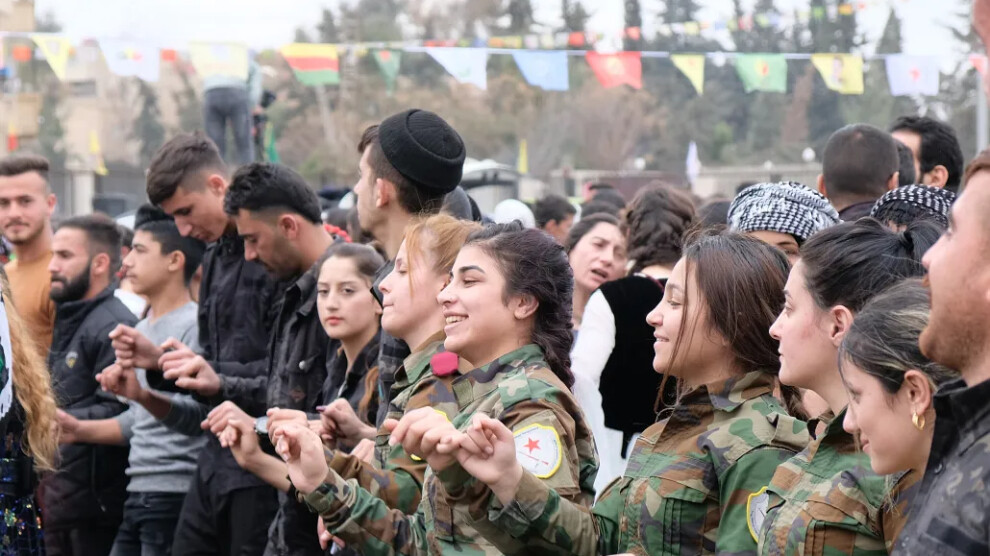Rojava Revolution, 11 years on
The ‘Rojava Revolution’ began eleven years ago today, when three predominantly Kurdish-inhabited areas of Syria declared their autonomy from the central Syrian government.
The ‘Rojava Revolution’ began eleven years ago today, when three predominantly Kurdish-inhabited areas of Syria declared their autonomy from the central Syrian government.

The ‘Rojava Revolution’ began 11 years ago, on 19 July 2012, when three predominantly Kurdish-inhabited areas of Syria declared their autonomy from the central government.
Since then, a democratic, autonomous administration has attempted to create a grassroots, gender-equal and ecological society in these areas. Communes and councils, the democratic representatives of the population, organize life and administer society.
The political model has thus established itself in decided opposition to the old Ba’ath regime. Numerous people within society are involved in a wide variety of local and social activities – from the communes and councils to working in the health sector, the women’s movement or in self-defence structures.
In its history of the Rojava Revolution, the Rojava Information Centre (RIC) underlined that "Rojava has also been synonymous with the war against the Islamic State (ISIS), the occupation of Turkey, overcrowded refugee camps, water shortages, crop failures and widespread poverty. But against the backdrop of an ongoing war, occupation, an embargo due to the Syrian Civil War, and a precarious humanitarian situation that makes basic staples scarce, Rojava has held its ground for ten years. The areas controlled by the democratic ‘Autonomous Administration of North and East Syria’ (AANES) have grown since 2012 and now include a third of Syrian territory and nearly a fifth of its population."
Eleven years on, the "continued existence of North and East Syria (NES) – the more inclusive name of the region, which encompasses Kurdish-majority Rojava and the Arab-majority areas on the banks of the Euphrates – is an achievement in and of itself. In the eleven years since 2011, the Rojava Revolution has remained committed to its former values and consolidated its achievements, even as all other gains of the so-called ‘Arab Spring’ uprisings were squashed or coopted by national governments."
RIC said: "The Rojava Revolution began eleven years ago in Kobane. As a result, an ‘autonomous administration’ was established to manage society based on the values of (direct) democracy, gender liberation and ecology. For ten years, this administration (under different names; see below) has fought off a number of internal and external enemies. In addition to the military, diplomatic and economic disputes with the Syrian government of Bashar al-Assad, it is above all the wars with Turkey and ISIS that threaten the very existence of the region’s political project. Turkey has invaded NES twice since 2016, and continues to occupy large swaths of northern Syria. ISIS was only territorially defeated in 2019, after more than four gruelling years since it was first pushed back during the 2014-2015 Battle for Kobane. Since then, however, ISIS has remained active in NES, staging occasional large attacks, while waging an irregular war of attrition in the Deir ez-Zor region and beyond. It has by no means been defeated.
Despite all these adversities, NES society has continued to establish and develop (relatively) stable political structures. Legal institutions, such as peace committees, have been introduced. These consensus-based bodies are responsible for resolving conflicts and have largely replaced the hierarchical court system common in Western societies. In addition, two social contracts – akin to a local constitution – were adopted in 2014 and 2016, as the product of a collaborative social process during which collective discussions determined which topics would be included. Work on a new social contract, which will better reflect all regions under the AANES umbrella, is currently underway. These social contracts have formalized the already-decentralized decision-making processes in the region and consolidated much of the legislative power of local councils. Many of these changes in NES can be described as a radical democratization of society and life. This, in turn, is changing the way people think and conceive of legal concepts such as law and justice."